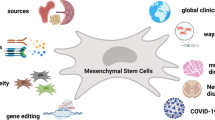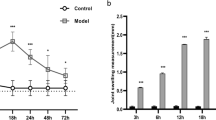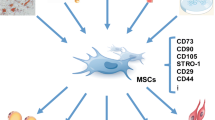Abstract
This study aimed to evaluate the potential of mesenchymal stem cell–derived exosomes loaded with curcumin (Curc-Exos) as an effective therapeutic strategy for rheumatoid arthritis through modulation of proliferation and inflammatory response in HIG-82 synovial cells. For this purpose, Exos were isolated and characterized with BCA protein assay, DLS, FE-SEM, and TEM. The Curc was embedded by mixing it with Exos in a 1:4 ratio. It was found that the Curc stability has improved after loading on Exos compared to the free Curc. Besides, the in vitro studies using LPS-stimulated HIG-82 synovial cells indicated the efficiency of Curc-Exos in enhancing cytotoxicity and apoptosis compared to the free Curc treatment. It was also revealed that Curc-Exos significantly could reduce the expression levels of anti-apoptotic proteins IAP1 and IAP2 and inflammatory mediators including IL-6, TNF-α, MMP1, and PGE2. This preliminary study confirmed the suitability of Curc-Exos in counteracting the proliferation and inflammatory response of rheumatoid arthritis synovial fibroblasts in vitro.







Similar content being viewed by others
Data Availability
The data that support the findings of this study are available from the corresponding author, upon reasonable request.
References
Manca, M. L., Lattuada, D., Valenti, D., Marelli, O., Corradini, C., Fernàndez-Busquets, X., Zaru, M., Maccioni, A. M., Fadda, A. M., & Manconi, M. (2019). Potential therapeutic effect of curcumin loaded hyalurosomes against inflammatory and oxidative processes involved in the pathogenesis of rheumatoid arthritis: The use of fibroblast-like synovial cells cultured in synovial fluid. European Journal of Pharmaceutics and Biopharmaceutics, 136, 84–92.
Lefevre, S., Meier, F., Neumann, E., & Muller-Ladner, U. (2015). Role of synovial fibroblasts in rheumatoid arthritis. Current Pharmaceutical Design, 21(2), 130–141.
Mor, A., Abramson, S. B., & Pillinger, M. H. (2005). The fibroblast-like synovial cell in rheumatoid arthritis: A key player in inflammation and joint destruction. Clinical Immunology, 115(2), 118–128.
Masoumi M, Bashiri H, Khorramdelazad H, Barzaman K, Hashemi N, Sereshki HA, Sahebkar A, Karami J (2020) Destructive roles of fibroblast-like synoviocytes in chronic inflammation and joint damage in rheumatoid arthritis. Inflammation:1–14
Coutant, F., & Miossec, P. (2020). Evolving concepts of the pathogenesis of rheumatoid arthritis with focus on the early and late stages. Current Opinion in Rheumatology, 32(1), 57–63.
Mateen, S., Moin, S., Khan, A. Q., Zafar, A., & Fatima, N. (2016). Increased reactive oxygen species formation and oxidative stress in rheumatoid arthritis. PLoS One, 11(4), e0152925.
Mateen, S., Moin, S., Khan, A. Q., Zafar, A., Fatima, N., & Shahzad, S. (2018). Role of hydrotherapy in the amelioration of oxidant-antioxidant status in rheumatoid arthritis patients. International Journal of Rheumatic Diseases, 21(10), 1822–1830.
Maity, S., Misra, A., & Wairkar, S. (2021). Novel injectable carrier based corticosteroid therapy for treatment of rheumatoid arthritis and osteoarthritis. Journal of Drug Delivery Science and Technology, 61, 102309.
Mashayekhi, S., Rasoulpoor, S., Shabani, S., Esmaeilizadeh, N., Serati-Nouri, H., Sheervalilou, R., & Pilehvar-Soltanahmadi, Y. (2020). Curcumin-loaded mesoporous silica nanoparticles/nanofiber composites for supporting long-term proliferation and stemness preservation of adipose-derived stem cells. International Journal of Pharmaceutics, 587, 119656.
Montazeri, M., Pilehvar-Soltanahmadi, Y., Mohaghegh, M., Panahi, A., Khodi, S., Zarghami, N., & Sadeghizadeh, M. (2017). Antiproliferative and apoptotic effect of dendrosomal curcumin nanoformulation in P53 mutant and wide-type cancer cell lines. Anti-Cancer Agents in Medicinal Chemistry, 17(5), 662–673. (Formerly Current Medicinal Chemistry-Anti-Cancer Agents).
Wei, W., Zarghami, N., Abasi, M., Ertas, Y. N., & Pilehvar, Y. (2022). Implantable magnetic nanofibers with on–off switchable release of curcumin for possible local hyperthermic chemotherapy of melanoma. Journal of Biomedical Materials Research Part A, 110(4), 851–860.
Serati-Nouri, H., Mahmoudnezhad, A., Bayrami, M., Sanajou, D., Tozihi, M., Roshangar, L., Pilehvar, Y., & Zarghami, N. (2021). Sustained delivery efficiency of curcumin through ZSM-5 nanozeolites/electrospun nanofibers for counteracting senescence of human adipose-derived stem cells. Journal of Drug Delivery Science and Technology, 66, 102902.
Abd El-Hack, M. E., El-Saadony, M. T., Swelum, A. A., Arif, M., Abo Ghanima, M. M., Shukry, M., Noreldin, A., Taha, A. E., & El-Tarabily, K. A. (2021). Curcumin, the active substance of turmeric: Its effects on health and ways to improve its bioavailability. Journal of the Science of Food and Agriculture, 101(14), 5747–5762.
Peng, Y., Ao, M., Dong, B., Jiang, Y., Yu, L., Chen, Z., Hu, C., & Xu, R. (2021). Anti-inflammatory effects of curcumin in the inflammatory diseases: Status, limitations and countermeasures. Drug Design Development and Therapy, 15, 4503.
Kunwar A, Priyadarsini K (2016) Curcumin and its role in chronic diseases. Anti-inflammatory nutraceuticals and chronic diseases:1–25
Montazeri, M., Sadeghizadeh, M., Pilehvar-Soltanahmadi, Y., Zarghami, F., Khodi, S., Mohaghegh, M., Sadeghzadeh, H., & Zarghami, N. (2016). Dendrosomal curcumin nanoformulation modulate apoptosis-related genes and protein expression in hepatocarcinoma cell lines. International Journal of Pharmaceutics, 509(1–2), 244–254.
Farajzadeh, R., Pilehvar-Soltanahmadi, Y., Dadashpour, M., Javidfar, S., Lotfi-Attari, J., Sadeghzadeh, H., Shafiei-Irannejad, V., & Zarghami, N. (2018). Nano-encapsulated metformin-curcumin in PLGA/PEG inhibits synergistically growth and hTERT gene expression in human breast cancer cells. Artificial Cells Nanomedicine and Biotechnology, 46(5), 917–925.
Sun, D., Zhuang, X., Zhang, S., Deng, Z.-B., Grizzle, W., Miller, D., & Zhang, H.-G. (2013). Exosomes are endogenous nanoparticles that can deliver biological information between cells. Advanced drug delivery reviews, 65(3), 342–347.
Moghadasi, S., Elveny, M., Rahman, H. S., Suksatan, W., Jalil, A. T., Abdelbasset, W. K., Yumashev, A. V., Shariatzadeh, S., Motavalli, R., Behzad, F., et al. (2021). A paradigm shift in cell-free approach: the emerging role of MSCs-derived exosomes in regenerative medicine. Journal of Translational Medicine, 19(1), 1–21.
Sun, D., Zhuang, X., Xiang, X., Liu, Y., Zhang, S., Liu, C., Barnes, S., Grizzle, W., Miller, D., & Zhang, H.-G. (2010). A novel nanoparticle drug delivery system: The anti-inflammatory activity of curcumin is enhanced when encapsulated in exosomes. Molecular Therapy, 18(9), 1606–1614.
Tarhriz, V., Eyvazi, S., Musavi, M., Abasi, M., Sharifi, K., Ghanbarian, H., & Hejazi, M. S. (2019). Transient induction of Cdk9 in the early stage of differentiation is critical for myogenesis. Journal of Cellular Biochemistry, 120(11), 18854–18861.
McClements, D. J., Zou, L., Zhang, R., Salvia-Trujillo, L., Kumosani, T., & Xiao, H. (2015). Enhancing nutraceutical performance using excipient foods: Designing food structures and compositions to increase bioavailability. Comprehensive Reviews in Food Science and Food Safety, 14(6), 824–847.
Chen, S.-Y., Shiau, A.-L., Wu, C.-L., & Wang, C.-R. (2017). P53-derived hybrid peptides induce apoptosis of synovial fibroblasts in the rheumatoid joint. Oncotarget, 8(70), 115413.
Piao, X., Zhou, J., & Xue, L. (2021). Triptolide decreases rheumatoid arthritis fibroblast-like synoviocyte proliferation, invasion, inflammation and presents a therapeutic effect in collagen-induced arthritis rats via inactivating lncRNA RP11–83J16 1 mediated URI1 and β-catenin signaling. International Immunopharmacology, 99, 108010.
Takeuchi, T., Yoshida, H., & Tanaka, S. (2021). Role of interleukin-6 in bone destruction and bone repair in rheumatoid arthritis. Autoimmunity Reviews, 20(9), 102884.
Makuch, S., Więcek, K., & Woźniak, M. (2021). The Immunomodulatory and anti-inflammatory effect of curcumin on immune cell populations, cytokines, and in vivo models of rheumatoid arthritis. Pharmaceuticals, 14(4), 309.
Brombini, G., Rahal, S. C., Santos, I. F. C., & Panebianco, G. (2020). Pressão articular na osteoartrose femorotibial de cães (Canis lupus familiaris)–Uma revisão sistemática. Veterinária e Zootecnia, 27, 1–6.
Dai, Q., Di Zhou, L. X., & Song, X. (2018). Curcumin alleviates rheumatoid arthritis-induced inflammation and synovial hyperplasia by targeting mTOR pathway in rats. Drug Design Development and Therapy, 12, 4095.
Pirmardvand Chegini, S., Varshosaz, J., & Taymouri, S. (2018). Recent approaches for targeted drug delivery in rheumatoid arthritis diagnosis and treatment. Artificial Cells Nanomedicine and Biotechnology, 46(sup2), 502–514.
Hewlings, S. J., & Kalman, D. S. (2017). Curcumin: A review of its effects on human health. Foods, 6(10), 92.
Martín-López, M., Carmona, L., Balsa, A., Calvo-Alén, J., Sanmartí, R., Tornero, J., & Rosas, J. (2018). Serum drug levels of biologic agents in the management of rheumatoid arthritis and spondyloarthritis: A systematic review. Rheumatology International, 38(6), 975–983.
Eyvazi, S., Khamaneh, A. M., Tarhriz, V., Bandehpour, M., Hejazi, M. S., Sadat, A. T. E., & Sepehri, B. (2020). CpG islands methylation analysis of CDH11, EphA5, and HS3ST2 genes in gastric adenocarcinoma patients. Journal of Gastrointestinal Cancer, 51(2), 579–583.
Wang, Q., Ye, C., Sun, S., Li, R., Shi, X., Wang, S., Zeng, X., Kuang, N., Liu, Y., & Shi, Q. (2019). Curcumin attenuates collagen-induced rat arthritis via anti-inflammatory and apoptotic effects. International Immunopharmacology, 72, 292–300.
Moon, D.-O., Kim, M.-O., Choi, Y. H., Park, Y.-M., & Kim, G.-Y. (2010). Curcumin attenuates inflammatory response in IL-1β-induced human synovial fibroblasts and collagen-induced arthritis in mouse model. International Immunopharmacology, 10(5), 605–610.
Arora, R., Kuhad, A., Kaur, I., & Chopra, K. (2015). Curcumin loaded solid lipid nanoparticles ameliorate adjuvant-induced arthritis in rats. European Journal of Pain, 19(7), 940–952.
Ahmed, K., Li, Y., McClements, D. J., & Xiao, H. (2012). Nanoemulsion-and emulsion-based delivery systems for curcumin: Encapsulation and release properties. Food Chemistry, 132(2), 799–807.
Liu, C.-H., Lee, G.-W., Wu, W.-C., & Wang, C.-C. (2020). Encapsulating curcumin in ethylene diamine-β-cyclodextrin nanoparticle improves topical cornea delivery. Colloids and Surfaces B: Biointerfaces, 186, 110726.
Yousefi, V., Tarhriz, V., Eyvazi, S., & Dilmaghani, A. (2020). Synthesis and application of magnetic@ layered double hydroxide as an anti-inflammatory drugs nanocarrier. Journal of Nanobiotechnology, 18(1), 1–11.
Oskouie, M. N., Aghili Moghaddam, N. S., Butler, A. E., Zamani, P., & Sahebkar, A. (2019). Therapeutic use of curcumin-encapsulated and curcumin-primed exosomes. Journal of Cellular Physiology, 234(6), 8182–8191.
Mansouri, E., Tarhriz, V., Yousefi, V., & Dilmaghani, A. (2020). Intercalation and release of an anti-inflammatory drug into designed three-dimensionally layered double hydroxide nanostructure via calcination–reconstruction route. Adsorption, 26(6), 835–842.
Aqil, F., Munagala, R., Jeyabalan, J., Agrawal, A. K., & Gupta, R. (2017). Exosomes for the enhanced tissue bioavailability and efficacy of curcumin. The AAPS Journal, 19(6), 1691–1702.
Sun, D., Zhuang, X., Grizzle, W., Miller, D., Zhang, H.-G. (2011). A novel nanoparticle drug delivery system: The anti-inflammatory activity of curcumin is enhanced when encapsulated in exosomes. Molecular Therapy, 18(9), 1606–1614.
Widjaja, G., Jalil, A. T., Budi, H. S., Abdelbasset, W. K., Efendi, S., Suksatan, W., Rita, R. S., Satria, A. P., Aravindhan, S., & Saleh, M. M. (2022). Mesenchymal stromal/stem cells and their exosomes application in the treatment of intervertebral disc disease: A promising frontier. International Immunopharmacology, 105, 108537.
Chen, W., Huang, Y., Han, J., Yu, L., Li, Y., Lu, Z., Li, H., Liu, Z., Shi, C., & Duan, F. (2016). Immunomodulatory effects of mesenchymal stromal cells-derived exosome. Immunologic Research, 64(4), 831–840.
Yang, H., Zhou, J., Pan, H., Wei, W., Gao, R., & Zhou, Q. (2021). Mesenchymal stem cells derived-exosomes as a new therapeutic strategy for acute soft tissue injury. Cell Biochemistry and Function, 39(1), 107–115.
Wang, W., Sun, W., & Jin, L. (2017). Caffeic acid alleviates inflammatory response in rheumatoid arthritis fibroblast-like synoviocytes by inhibiting phosphorylation of IκB kinase α/β and IκBα. International Immunopharmacology, 48, 61–66.
Sheikh, E., Bhatt, M., & Tripathi, M. (2017). Role of nano-curcumin: A treatment for cancer. Journal of Medical Plants, 5, 394–397.
Quispe C, Cruz-Martins N, Manca ML, Manconi M, Sytar O, Hudz N, Shanaida M, Kumar M, Taheri Y, Martorell M (2021) Nanoderived therapeutic formulations with curcumin in inflammation-related diseases. Oxidative Medicine and Cellular Longevity, 2021, 3149223.
Kamal, D. A. M., Salamt, N., Yusuf, A. N. M., Kashim, M. I. A. M., & Mokhtar, M. H. (2021). Potential health benefits of curcumin on female reproductive disorders: A review. Nutrients, 13(9), 3126.
Acknowledgements
The authors would like to thank the “Immunogenetics Research Center, Department of Tissue Engineering and Applied Cell Sciences, Faculty of Advanced Technologies in Medicine, Mazandaran University of Medical Sciences” for their kindly cooperation.
Author information
Authors and Affiliations
Contributions
XH and CZ: Methodology, investigation, data curation, original draft preparation. SA: Formal analysis. ATJ and MMK: Methodology, investigation, software. MA and YP: Supervision, conceptualization, writing—review and editing.
Corresponding authors
Ethics declarations
Ethics Approval
Not applicable.
Consent to Participate
Not applicable.
Consent for Publication
Not applicable.
Competing Interests
The authors declare no competing interests.
Additional information
Publisher's Note
Springer Nature remains neutral with regard to jurisdictional claims in published maps and institutional affiliations.
Rights and permissions
Springer Nature or its licensor holds exclusive rights to this article under a publishing agreement with the author(s) or other rightsholder(s); author self-archiving of the accepted manuscript version of this article is solely governed by the terms of such publishing agreement and applicable law.
About this article
Cite this article
He, X., Zhang, C., Amirsaadat, S. et al. Curcumin-Loaded Mesenchymal Stem Cell–Derived Exosomes Efficiently Attenuate Proliferation and Inflammatory Response in Rheumatoid Arthritis Fibroblast-Like Synoviocytes. Appl Biochem Biotechnol 195, 51–67 (2023). https://doi.org/10.1007/s12010-022-04090-5
Accepted:
Published:
Issue Date:
DOI: https://doi.org/10.1007/s12010-022-04090-5




